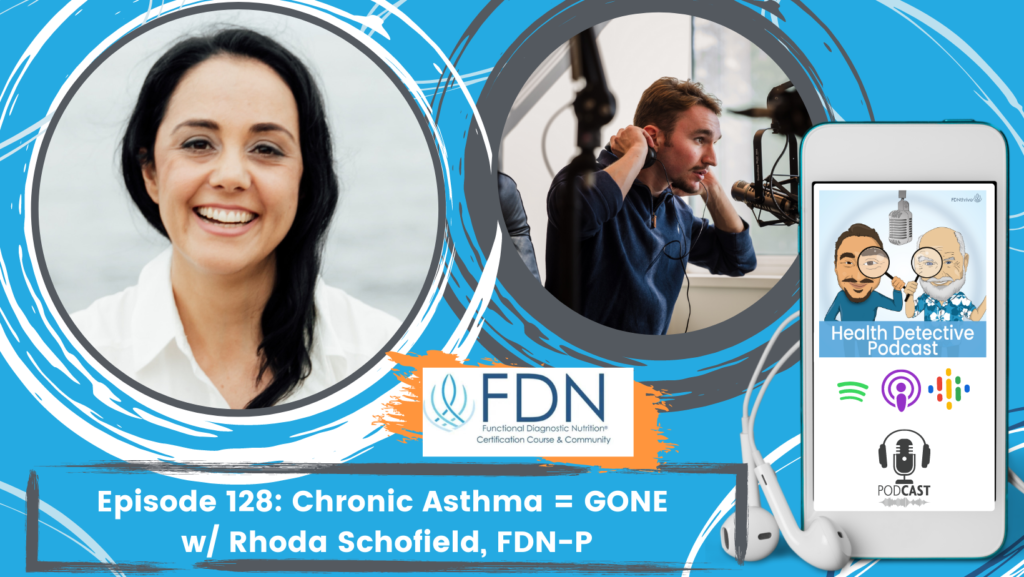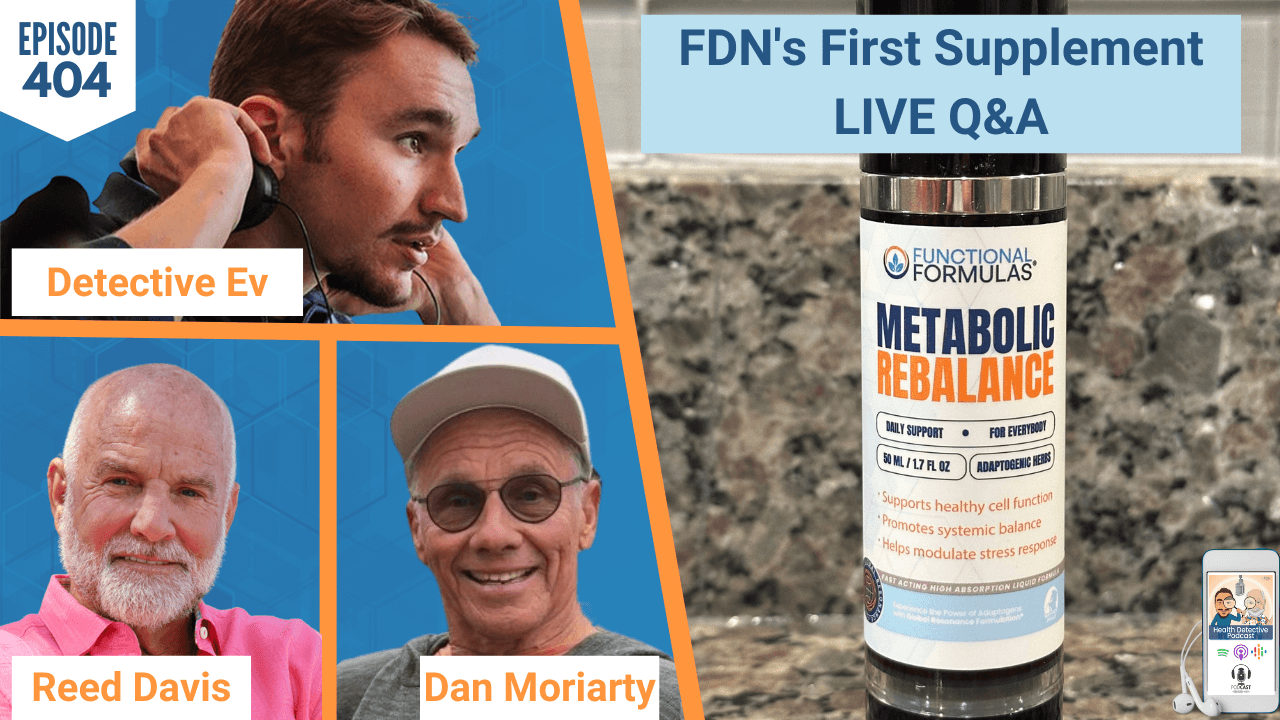Introduction
[00:00:00] Detective Ev: All right, what is going on my friends? Welcome back to another episode of the Health Detective Podcast by Functional Diagnostic Nutrition. My name is Evan Transue, AKA Detective Ev. I will be your host for today’s show in which we are discussing chronic asthma.
We’re talking to someone across the world. This is our first interview with someone who is currently and presently in the country of Australia. Her name is Rhoda Scofield, and she’s a certified Functional Diagnostic Nutrition Practitioner, as well as a personal trainer.

Now, Rhoda is one of those people who is kind of the epitome of the type of person that comes into the world of FDN and then chooses to do this as work. She is someone who has dealt with a variety of different health symptoms and issues, and then you guys know how this goes. They end up going from doctor to doctor, practitioner to practitioner, trying to figure this stuff out. But it turns out it’s the treating of these things specifically that does not work so well.
That’s why at FDN, we don’t treat anything specifically. We’re addressing everything in a non-specific fashion with the faith that when the body is healthy and if we can do the things to make the body healthy, the health symptoms are going to go away. A healthy body, if it’s truly healthy, cannot have symptoms by definition.
About Rhoda
Rhoda specializes in helping busy entrepreneurs fix their spiraling health issues so that they can optimize their health and get back to living their A game again. Rhoda has personally overcome chronic asthma, migraines, digestion issues, acne, allergies, bloating, fatigue, anxiety, weight issues, and now helps others overcome at similar symptoms and truly become the healthiest versions of themselves in the long run.
Again, someone that is the total epitome of what we’re talking about here. This just proves that this is a result and a problem of the modern world. It’s not just the USA, although the USA, I would say, is particularly bad with this. It’s not just Canada. It’s not just the UK.
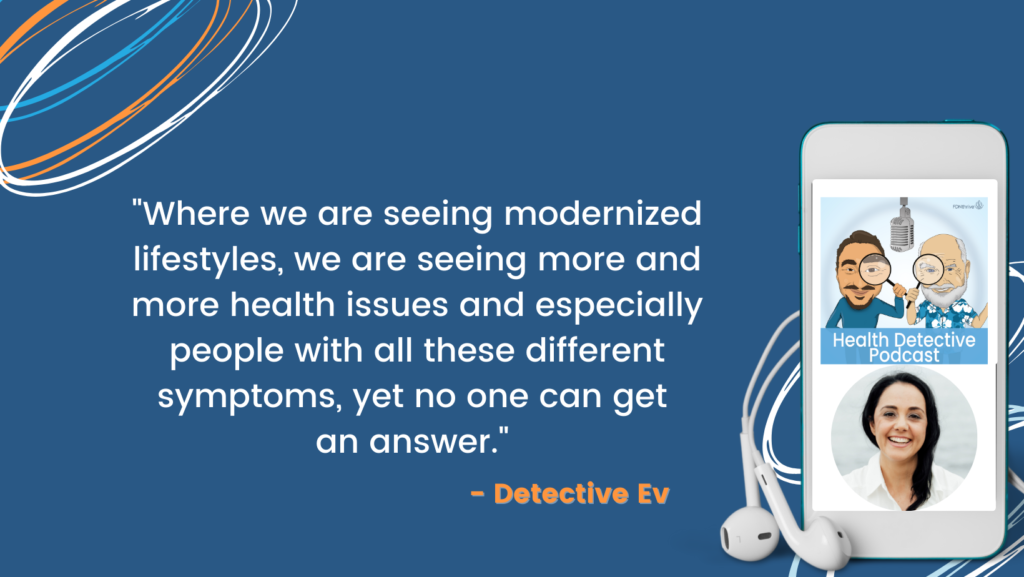
Where we are seeing modernized lifestyles, we are seeing more and more health issues and especially people with all these different symptoms, yet no one can get an answer. So, they got to come to the world of functional healthcare. We are going to talk about how Rhoda finally overcame these things, and now is helping others do the same with the Functional Diagnostic Nutrition certification.
Without further ado, let’s get to the episode. All right. Hey there, Rhoda. Thanks so much for being here with us today.
[00:02:23] Rhoda Schofield: Hi, Evan. It’s great to be here.
[00:02:23] Detective Ev: Very excited! Across the world right now interview. So that’s pretty cool. You’re in Australia, correct?
[00:02:31] Rhoda Schofield: Yes, I am. The afternoon your time, but it’s actually early in the morning on a Sunday here.
Lots of Layers, Starting with Chronic Asthma
[00:02:37] Detective Ev: Yeah. Well, I appreciate you hopping on, on a Sunday for us here. At the same time too, we’ve had people from all around the world, but I don’t know if anyone’s ever been actually physically in Australia when doing this show. So, that’s kind of cool, nice little milestone there.
But we will get this rolling with the same question that we always do on this show. That’s just as simple as when did your health symptoms begin and what did they look like? I see from the bio that you overcame quite a few things on your health journey.
[00:03:02] Rhoda Schofield: Yeah. So, I guess I realize now that my symptoms started as a baby. I had chronic asthma right from the age of about one onwards up until sort of my mid-thirties. I would say that it actually started then and slowly got worse over time.
[00:03:20] Detective Ev: Okay. What symptoms exactly were we looking at, at the time? What’s some of the first things that came in.

[00:03:24] Rhoda Schofield: I had chronic asthma and so it was something that wasn’t in my family at all. I was kind of in and out of hospital for most of my childhood. It got slightly better as I got older, but definitely had to live with asthma right up until my mid-thirties. I feel like my health journey, there was just lots of layers. So, it sort of started with the asthma.
FDN-like Health Coach for Chronic Asthma and All the Things
Then when I was in high school, I started getting quite debilitating migraines that would kind of put me out for days. That kind of started around high school. Then I started to get digestive issues. I know that’s quite a broad term, but that’s probably the best way to simply explain it, in my twenties. Then in my thirties, everything sort of got progressively worse.
I had all of those three main things and then started getting acne. Never had acne before even when I was hormonal in high school. Then I started getting quite like neurological issues, feeling anxiety, depression, just feeling really quite sad all the time. Whenever I was stressed, I’d get really noticeable heart palpitations. It was just everything slowly getting worse.
What actually tipped me over was I started to gain weight and weight was never an issue for me. On top of that, I just didn’t have the energy to go to the gym anymore. The gym was a real anchor for me, and I was really not getting results there. So that was kind of my tipping point where I actually knew something was wrong.
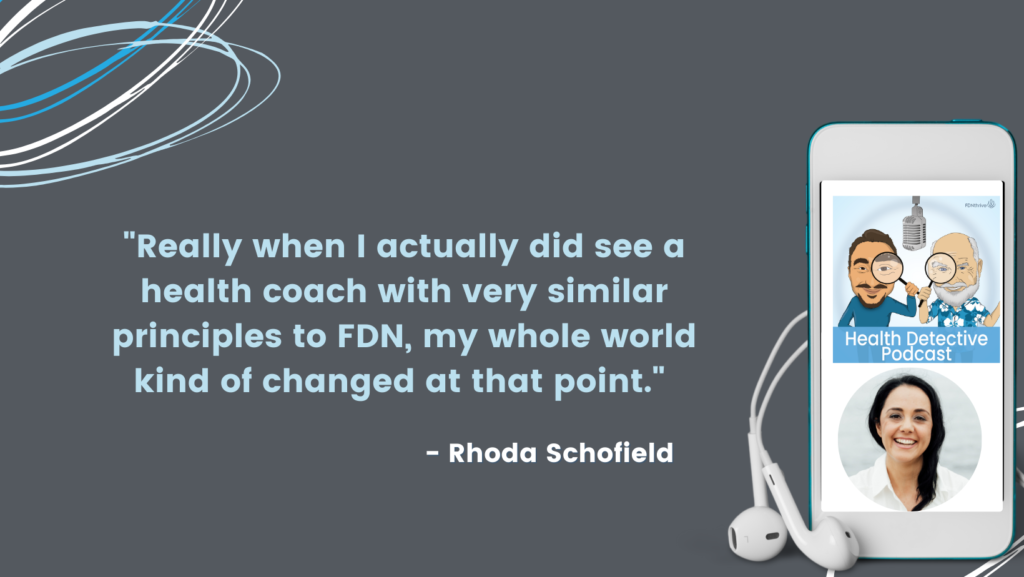
I actually went to a health coach saying, I don’t think there’s anything wrong with me, but I’m not getting any results in the gym anymore. I just want to get checked out. But I didn’t realize that all of my symptoms right from when I was a baby was all connected to where I was at. Really when I actually did see a health coach with very similar principles to FDN, my whole world kind of changed at that point.
The Tipping Point Wasn’t Chronic Asthma

[00:05:09] Detective Ev: Okay. I love what you said about the tipping point and it being the weight thing. That’s just a good way to describe it. I’m probably going to start stealing that from now on. I’m serious because in these interviews and just stories that I’ve heard from being a part of this community for five years now, everyone has this subjective limit more or less, which is where they finally draw the line. I’m going to go figure this stuff out. And sometimes it’s not what you think.
There are people that deal with cancer for years, and that’s not their tipping point. It might be something like weight. For myself, I dealt with severe cystic acne that would have literally gotten anyone over that line. But just for whatever reason, probably because I had it for so long or something, that wasn’t my tipping point.
My tipping point was when I got this diagnosis of Meniere’s disease, which is like an inner ear thing that was causing vertigo. In many ways that was not my worst symptom. My worst symptom was the mental health. My worst symptom was the cystic acne. Yet that was my subjective tipping point.
I think that matters. And I encourage people to try to do their best to have an earlier tipping point than some of us. We stack a lot of things on and it’s really amazing how much we can just let go (I’m fully in this boat. I did this myself), before we wake up one day and we just realize, wow, like, okay, there’s quite a few things wrong here, there? Maybe I should get this checked out.
Unaware of My Body
I think this has to do even more with like the paradigm that’s clearly a worldly thing. I talk to people, again, all over the world and they all have this same issue for the most part where you’re talking to this health coach. It’s not like you’re a stupid person, but you’re going in thinking there’s nothing wrong. Where now from your perspective as an FDN probably, if you saw someone with those symptoms, you would know instantly there has to be some metabolic chaos going on or something similar. You know what I mean?
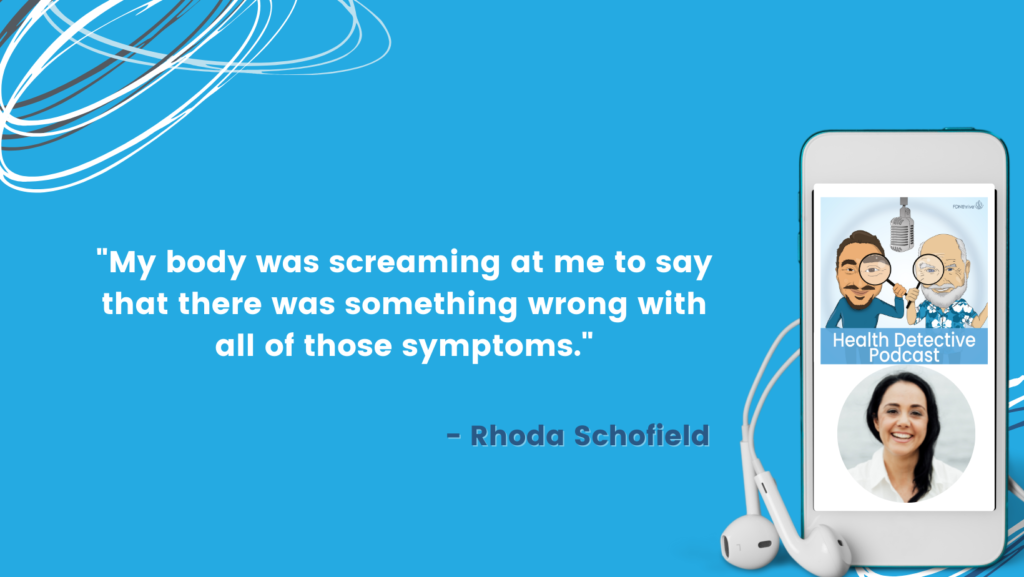
[00:06:44] Rhoda Schofield: Yes. And I think one thing through my health journey, I realized just how unaware of my body. My body was screaming at me to say that there was something wrong with all of those symptoms. It was really something quite superficial that made me go to see a health coach originally. It was only through the process that I realized it was all linked. Before that it was just something I lived with or felt like I just lived with. Like, I have asthma, you know. Like it’s just something I have.
I realized through the process that you don’t need to have symptoms. You can actually get through them with the right tools.
Living with Chronic Asthma but Seeking Out a Health Coach
[00:07:15] Detective Ev: Now, one thing I’d love to hone in on just for a moment is the idea of going to this health coach. These are such special moments to me in the show, because I really like to help people out there that might be suffering see what it was like for the other individual. How did you end up at a health coach? Not everyone does that.
Some people that I know that are very intelligent people, I’m not condemning them by any means. I don’t know what this quality is yet necessarily. I have a hint because I’ve done enough interviews. But I still haven’t pinpointed it exactly why some people do this, and some people don’t.
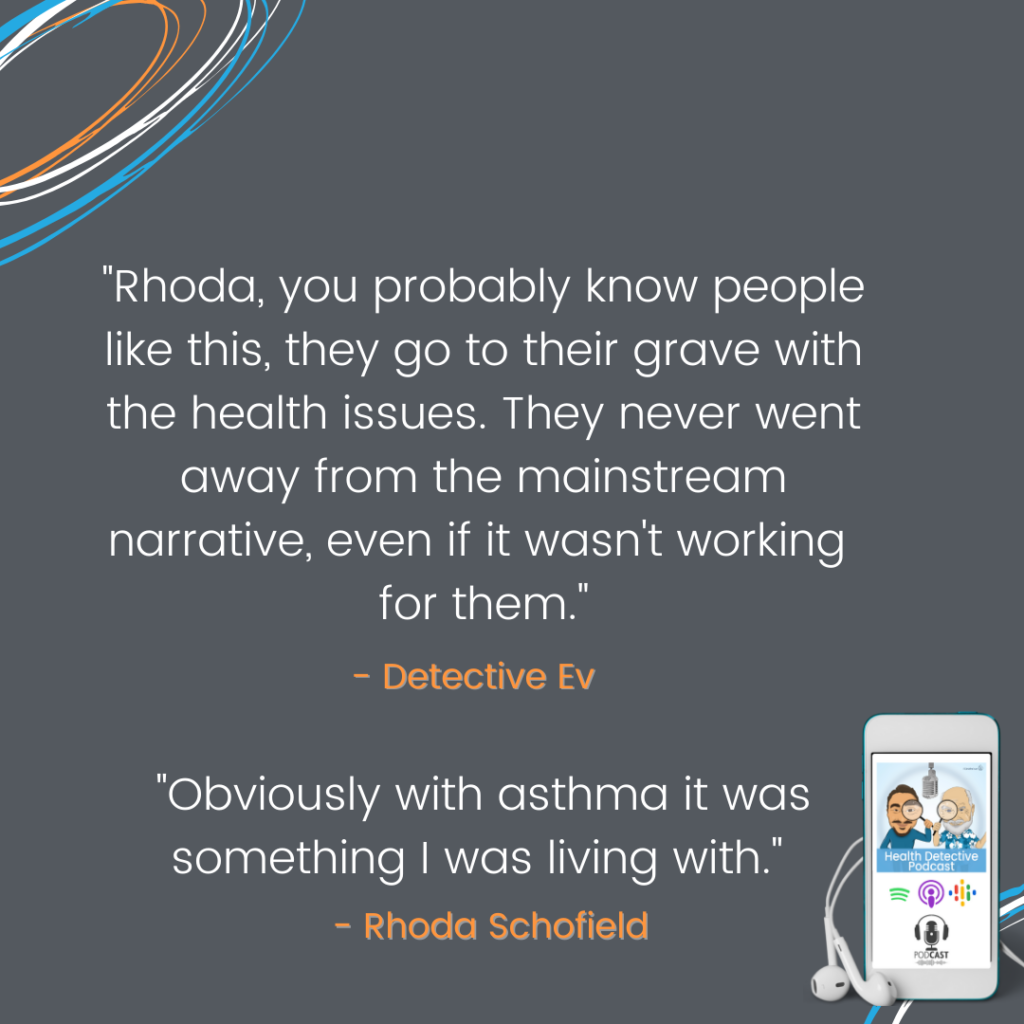
Rhoda, you probably know people like this, they go to their grave with the health issues. They never went away from the mainstream narrative, even if it wasn’t working for them. So, I don’t know if you were going to a bunch of doctors or all this stuff originally. I’m sure you did to get some of these diagnoses.
How do you go from there to a health coach? What transitioned to allow you to do that?
[00:08:05] Rhoda Schofield: Interestingly, I didn’t go to many doctors. Obviously with asthma it was something I was living with. I just used to go to doctors to get prescriptions filled and that sort of thing.
At the time I was a personal trainer, and I was very much in the fitness space. I thought I was healthy. To a degree, I was maybe compared to the average person with my knowledge of things. I was following my health coach. He was also a fitness trainer and had a gym in Melbourne. I was just following him.
On the Edge of an Autoimmune Disease with Chronic Asthma
He was quite focused on gut health and reading blood markers and that kind of thing. The data around what you can get through blood work really fascinated me. So, I really just kind of followed him and what he was doing. And just found it really interesting.
I actually went to him obviously from my own personal, but then at the same time I thought maybe I could help my clients this way from a personal training perspective. I went in thinking there was nothing wrong with me and maybe I can help clients through this journey. Then I came out realizing I had a lot to learn.
[00:09:06] Detective Ev: I’m still glad you caught it when you did. I guess technically asthma does classify in the auto-immune category. I’m curious though, did any other autoimmune illness ever strike you? Observationally from the list of symptoms that you’ve dealt with, usually I see someone ending up with an autoimmune disease eventually.
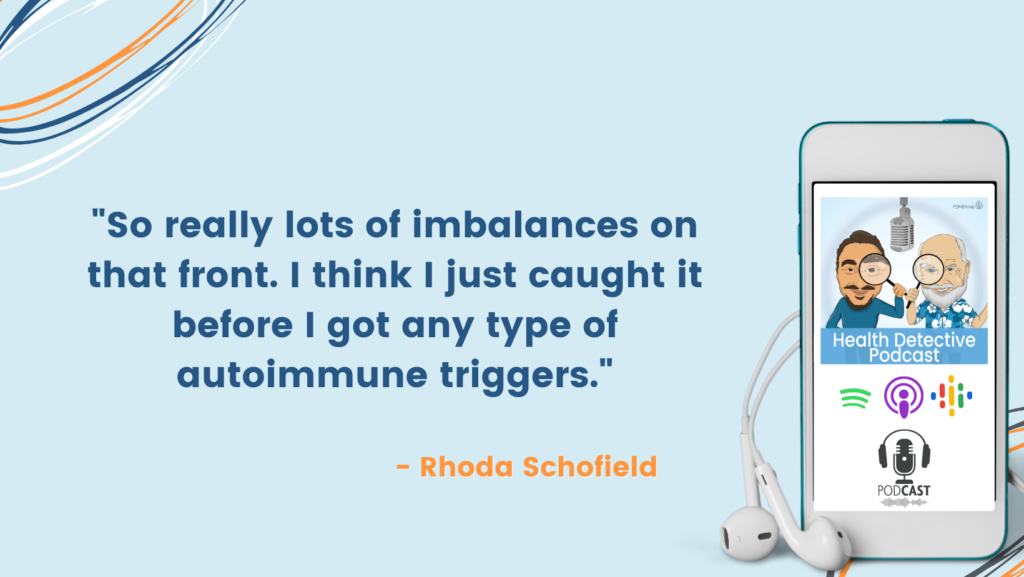
[00:09:21] Rhoda Schofield: He said I was on the edge of getting one. What he picked up was I had extremely unbalanced bacterial issues in my gut. I also had SIBO and Candida and that opportunistic bacteria overgrowth. So really lots of imbalances on that front. I think I just caught it before I got any type of autoimmune triggers.
Being Proactive Protects
[00:09:44] Detective Ev: And just for anyone listening that there might be confusion with, I want to be clear. I was not saying asthma is an autoimmune disease. Although Western medicine might not look at it this way, I have found it is in this same category. Again, all the symptoms that you had, it’s like, oh my goodness. How long before the autoimmune comes out, because it’s the classic stuff. You got the skin stuff. You got the migraines. You got the digestive stuff. There’s other things going on.
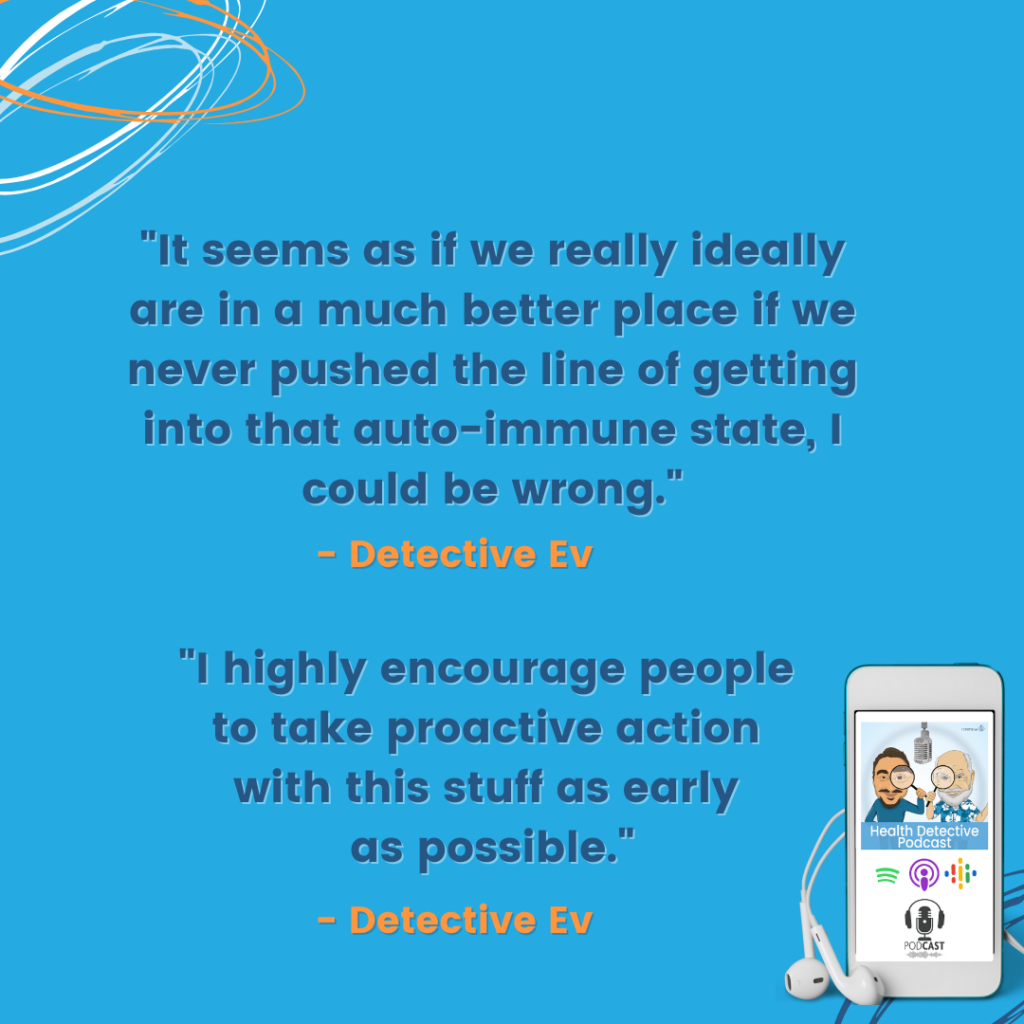
This is another thing almost just observationally from the years of talking to people. It seems as if we really ideally are in a much better place if we never pushed the line of getting into that auto-immune state, I could be wrong. But what I found is that it seems that people who cross that line, they have to be significantly more restrictive long-term. Because it’s almost like every time they cheat, for at least for some period of time, you can heal. But for some period of time, they trigger the autoimmune disease again.
Whereas if we have these symptoms, we can get them down and go out and enjoy yourself every now and then. You don’t have to be a crazy person with all the food for a year at a time. And it’s not going to automatically lead to an autoimmune disease. My mom dealt with one, I dealt with one. I highly encourage people to take proactive action with this stuff as early as possible. This is just an education thing. It’s like we were talking about.
What Really is “Unhealthy”?
Even myself, I didn’t look at myself as unhealthy for the longest time because I wasn’t overweight. I don’t mean that as an insult to anyone who’s overweight. It’s just that in my head, being unhealthy was being overweight and I was a skinny guy. So, oh yeah, I can have cystic acne, depression, panic attacks, sinusitis, and all this other stuff going on, but I’m healthy. You know, like Western medicine standards.
That is obviously not the case.
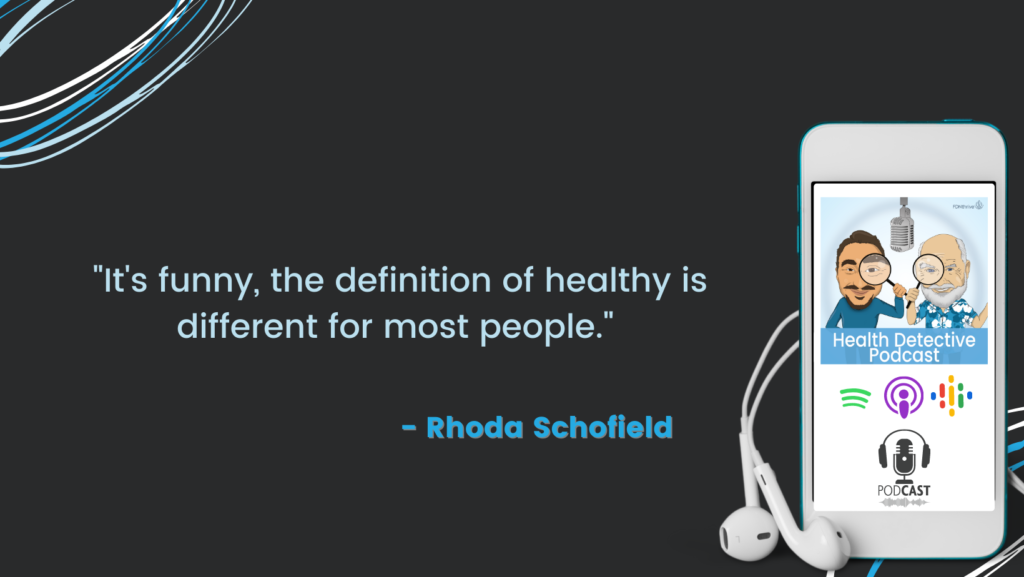
[00:11:20] Rhoda Schofield: If I was unhealthy, it was when you were in hospital, or had to see a doctor a lot and that was that wasn’t me. It’s funny, the definition of healthy is different for most people.
[00:11:31] Detective Ev: You’re working with this health coach who does something similar enough to FDN, maybe philosophy wise or pretty similar. You had these realizations where you’re like, wow, I actually do have stuff going on. I don’t know that we’ve gotten into any specifics per se. What were some of these realizations specifically?
Was it certain things on the labs that he ran? What led you to believe, wow, I do have some things to work on here?
A Whole Different Way of Thinking
[00:11:51] Rhoda Schofield: My hormones were all over the place. Pretty much all of my markers were just not right. I had quite high testosterone, quite low estrogen. Everything was just really out of balance hormonally.
From a gut perspective, all of my markers were quite out. I had quite a lot of opportunistic bacteria, which is like bacteria that shouldn’t be there was there. Then also my normal bacteria, this bacteria that’s meant to be there was really low. I had a real oversupply of what I didn’t need and an under supply of what I did.
As well as that, I had yeast issues, candida that had been there for quite a while, what I was told. Then I had classic symptoms of leaky gut and IBS as well as SIBO (small intestinal bacterial overgrowth). Lots going on there. It actually took about three protocols, about a year, to be able to have all of that balanced out. That was a real focused approach. Once I was in, I was really in.
He told me so many things that I didn’t really believe at the time. For example, he said that I was showing signs of malnourishment, signs that I wasn’t eating enough. That didn’t sound right because I was gaining weight. It was like, how can I not be eating enough and gaining weight?
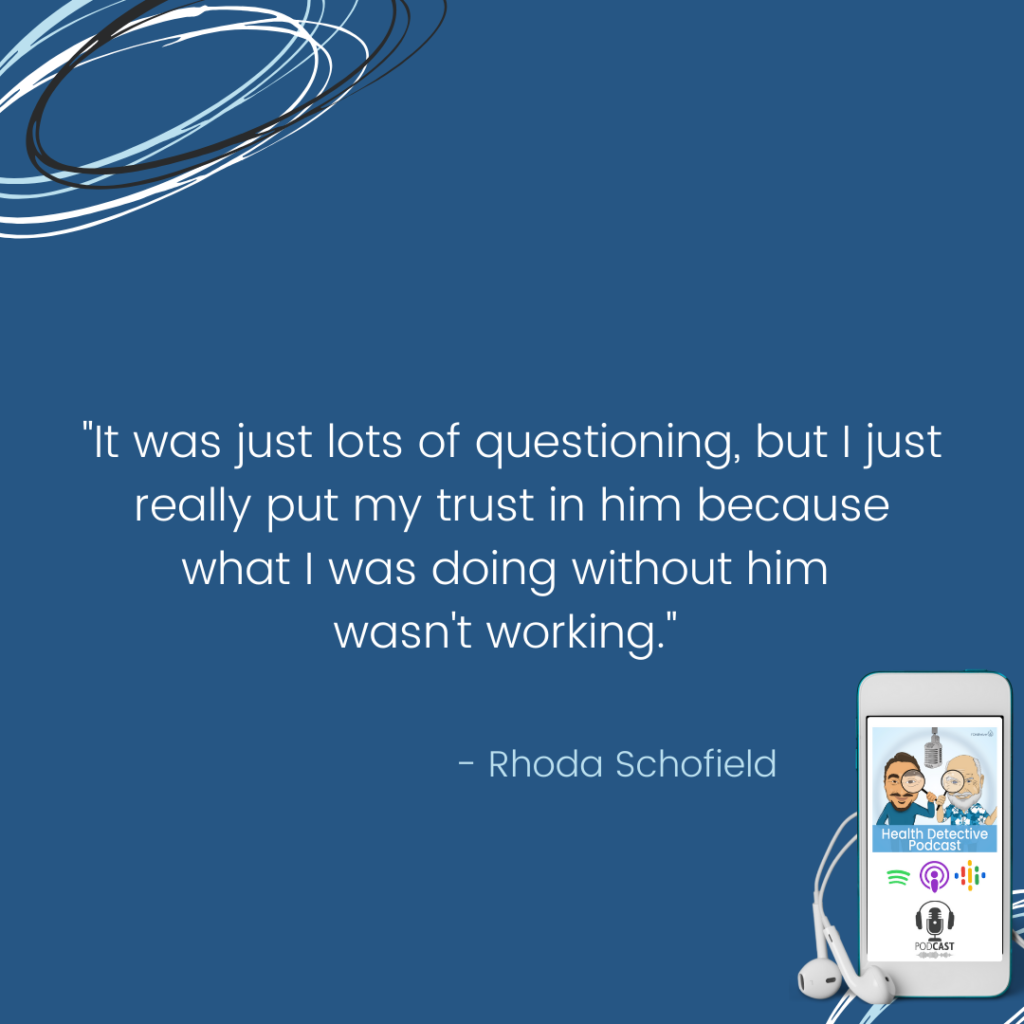
Then the other thing he was saying was that he felt like I was over-training at the gym. I just didn’t believe that because I was like, I can’t even finish my workouts. How can I be over-training? It was just lots of questioning, but I just really put my trust in him because what I was doing without him wasn’t working. I just kept on having to remind myself of that.
Ready to Do Whatever it Takes
I’m so glad I did. What happened was over that 12-month period. I know that sounds like a long time, but I was 36 at the time. For my whole 36 years, I’d been living with a lot. If you think about it from relative terms, taking a year to get better, how amazing is the body?
You know, 36 years of not treating it right to kind of just putting a bit more thought into everything. Then all of my excess weight just naturally went, even though I was eating more and training less. Just all of my symptoms went. Now I’m 42 and have been kind of just maintaining.
Now I’m in shape. Energy’s not a problem. I don’t have asthma anymore. I don’t even own an asthma puffer anymore. I don’t have acne. My skin’s really clear. All of the neurological issues (that was the massive thing that I didn’t realize was an issue), I really feel like a veil has lifted from my brain. I’m able to concentrate more.
I definitely don’t have any anxiety issues. So, neurologically was a massive, massive change in me. My whole life got better because of it. When you have that more positive attitude, things just fall into place. Digestive issues, not an issue anymore. Everything’s kind of just balanced out over that time. It was a massive lifestyle change, like kind of giving up alcohol, all of that sort of stuff.
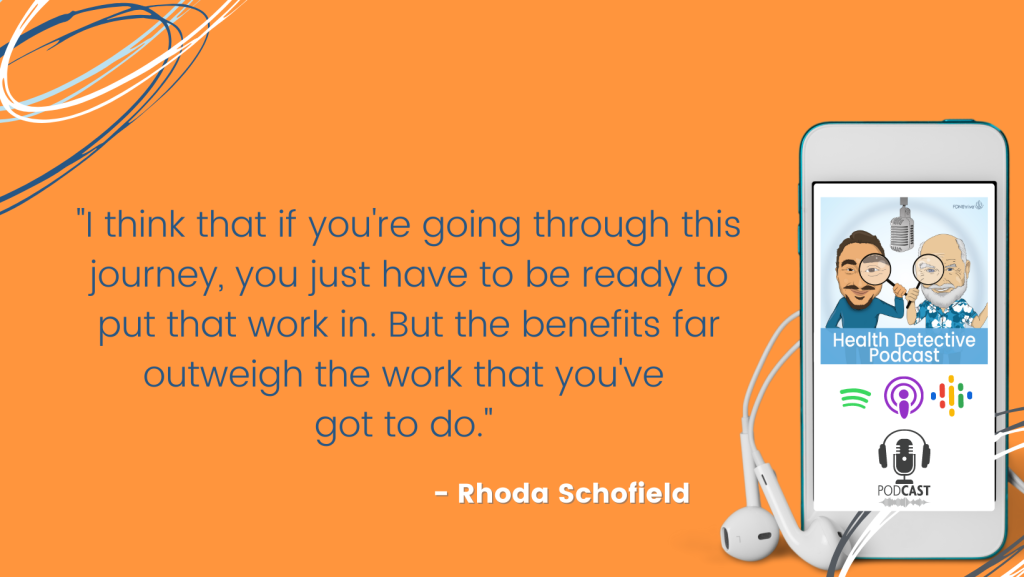
It was a massive lifestyle change, but I was ready. I think that if you’re going through this journey, you just have to be ready to put that work in. But the benefits far outweigh the work that you’ve got to do. I think.
Asthma Free Without Ever Treating Chronic Asthma
[00:14:46] Detective Ev: So many good things there. One, I got to ask is, just to be clear for the audience, what age were you diagnosed with asthma, roughly speaking? Then what age did you no longer deal with this and need the asthma inhaler?
[00:14:57] Rhoda Schofield: From about the age of one, I started getting asthma. Then we started my journey at 36, so around 38 was when I just didn’t need a puffer anymore at all, not even before exercise or anything like that.
[00:15:12] Detective Ev: That’s just absolutely incredible.
I mean, I don’t think it ever is going to get old to me hearing what the body is capable of and these kinds of stories of healing. I mean, most people would say that this is not possible, like you’re always going to live with that. It’s not even close to true. You dealt with this for decades and were able to get this resolved and under control eventually. Not by ever treating the symptom.

No one at FDN or I’m sure that functional health coach is saying, oh yeah, Rhoda, we’re going to treat the asthma. No, it’s the exact opposite. We’re not going to treat the asthma at all. We’re going to address the things in the body that are going wrong. And by definition, a healthy body does not have asthma. Then it becomes simple, not easy, but simple after that. We just need to do the right things over a sustained period of time. And here we go.
I also love what you said about the personal training. Because you have this personal trainer mindset, cause you were in that. You’re like, wait a second, I’m not over-training or doing all this stuff. We have to completely shift our mindset.
Challenging What We Think We Know About Health
I was a certified personal trainer at one point before FDN. I’m a 21-year-old guy and they were recommending at the time that I kind of limit my exercise to just walking. I’m like, what are you talking about? I need to be lifting weights and doing all this stuff.
Well, I took a week off. That’s all it took, like a week off. I hope I’m not off-putting to you. I’m always very transparent on this podcast. I will word it appropriately. My libido came back quite strongly in that week, Rhoda, that I had started doing things a little differently. To me, that was the motivating factor. Especially as a 21-year-old guy, I’m like, oh wow, this is actually working. Then it was like, my body’s under that much stress? I thought I was just a lower libido person. I’m like, this is how I’m supposed to feel when I’m not under constant stress? Wow.
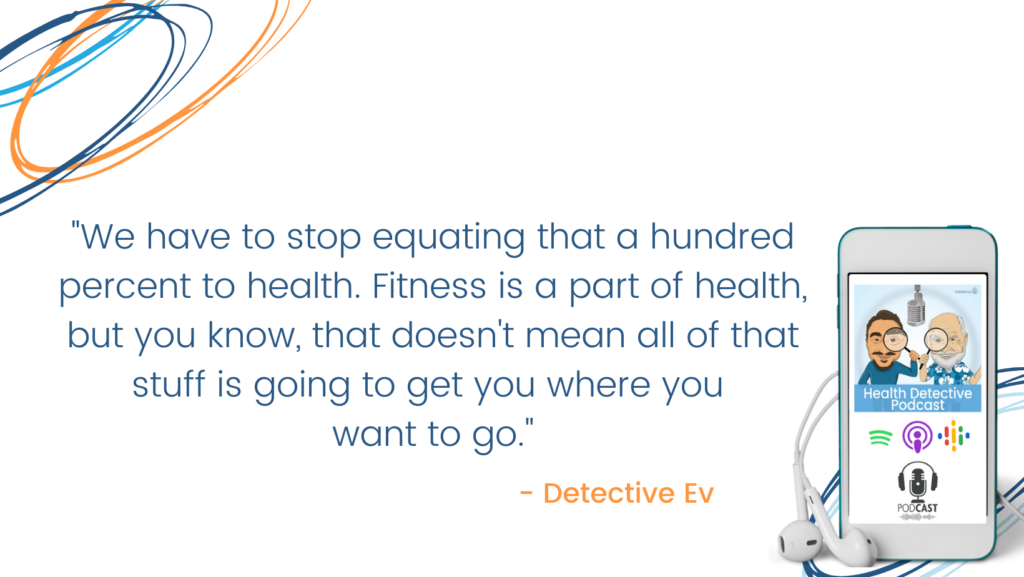
That’s interesting. We do have to change our paradigm sometime and really challenge what we think we know about health. We also have to understand the goals. Like with a classic personal trainer, I have a lot of friends in the bodybuilding space. Guys. We have to stop equating that a hundred percent to health. Fitness is a part of health, but you know, that doesn’t mean all of that stuff is going to get you where you want to go. I’ll get off my soap box, but there’s just a few important things. As you said, a lot of great stuff.
How did this eventually lead to FDN because this guy that you were working with is not an FDN. He did stuff like it. So, what led to you actually pursuing this course? And how did you find it?
Doing the FDN Course for the Insurance
[00:17:21] Rhoda Schofield: The coach who helped me get my health back on track, I actually mentored with him for a few years. I helped people organically in my network through what I was learning through him. But it wasn’t really something that I was actively following as a health coach.
I actually really just mentored with him because I was just so fascinated with what his method was and I just wanted to learn more. Then I had a feeling that I wanted to start helping others because of my massive transformation and just how much it changed my life.
But as I started getting more clients, it kind of bothered me that I didn’t have any public liability insurance to cover me just in case. For that reason, any of my clients wanted to see me, I just wasn’t covered, and I couldn’t be covered through just mentoring with him.

He actually recommended FDN to me. FDN is listed here in Australia as an authorized course through the IICT, and they offer full insurance to FDN graduates. So, my initial reason was just to kind of get insurance. It kind of sounds like a really boring reason, but that was my initial reason.
FDN – Getting Noticed for a Reason
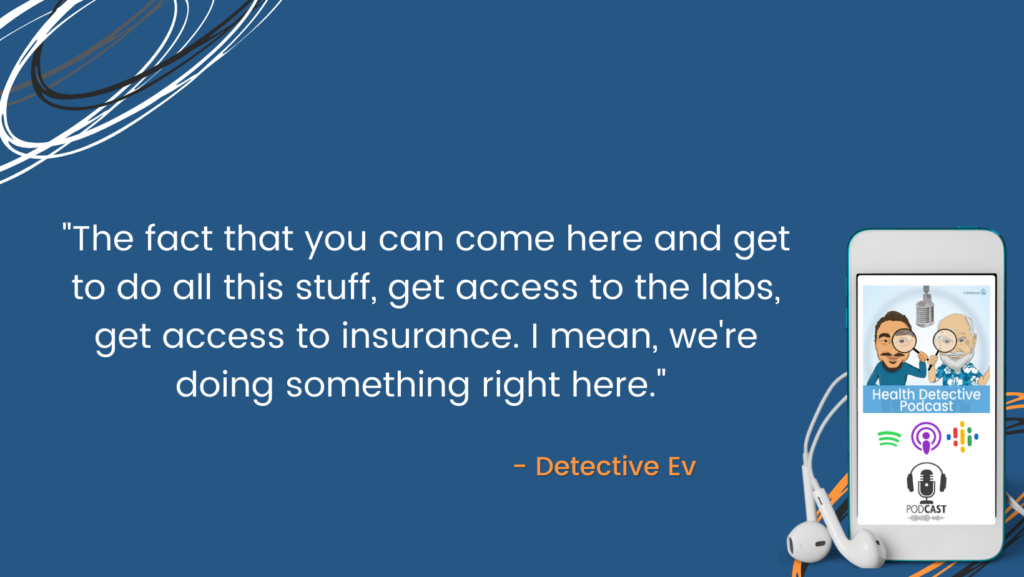
[00:18:25] Detective Ev: That’s fine with me. I think that’s a good shout out to what we do. The fact that you can come here and get to do all this stuff, get access to the labs, get access to insurance. I mean, we’re doing something right here. You know, it’s getting noticed for a reason.
I actually think that’s not a reason that people would typically say, but that’s actually a really good thing to explain to people. I don’t think many people would be aware of that. And I certainly don’t emphasize it enough admittedly, on the show. So that’s cool.
When did you end up starting the course? If I’m not mistaken, you’re a relatively new graduate, is that correct?
[00:18:50] Rhoda Schofield: Yes. I started the course in May 2020. And I finished it in December 2021. And we’re in March 2022 here, so I am relatively new to graduating.
I just do want to say that while my initial reasons for joining the course was for insurance, I’m so happy to have found this course. I don’t know if you want to go into now sort of what I found beneficial in the course. It kind of opened my eyes. I didn’t realize this course would be as good as what it is. I was initially getting it for insurance, you know, so we can go into why. But yeah, it’s definitely exceeded my expectations for sure.
Cool Labs that Give a Different Perspective
[00:19:33] Detective Ev: Perfect.
You beat me to it in that sense. So, what were you finding when you went through the FDN course? For those that don’t know, we give lab tests to our trainees. You literally are required (and it’s a fun requirement in my opinion), to take these labs while you’re going through the course. And you’re going to learn quite a bit.
I’m curious as to (even labs aside), just all of the cool things that you learned and what you liked most. Tell us.
[00:19:55] Rhoda Schofield: Well, we’ll start with the labs. It was great actually, to be able to get my own labs done and see where I was at. As you’ve already kind of heard, I’d been through quite a journey.

It’s funny when you go through this sort of holistic health space, you don’t just do a test, follow some protocols, and then you’re done. It’s kind of a lifetime worth of maintenance, tweaking, and that sort of thing. It was really exciting for me to get all of these tests done that I haven’t really heard about before. Usually, I just done blood work. So, it was great to get that different opinion just to sort of see where I was at. There was definitely some things that I could work on.
My normal bacteria was still pretty low. Just little tweaks that I found that was like, oh, okay. Let’s just sort of tweak that. But really good to see that overall, everything looked pretty good. It was really nice for me to see that all of this hard work that I put in towards my health was still there. So that was really good. For me personally, it was good to get my own labs done.
Further Study Opportunities
Then what I saw in FDN as a coach was that it was a wonderful compliment to what I was already doing in the blood work space. While my mentor was extremely knowledgeable and taught me so much, what I found was that having access to all of the hundreds of different lab screenings, and being authorized as an FDN practitioner to issue those tests as, and when I need was something that I would never be able to have access to if I didn’t find FDN.
Just having that in my tool belt was a massive benefit. I really felt like having access to those labs really meant for my clients, no stone is left unturned for them. I can really help people for sure find their healing opportunities and what they need to work on.
I really liked the fact that there were further study opportunities. Now that I’ve graduated, I’ll probably spend the next 12 months trying to kind of get clients and build my reach. But after about a year, there’s so many mini courses and extra qualifications that I definitely want to take up.
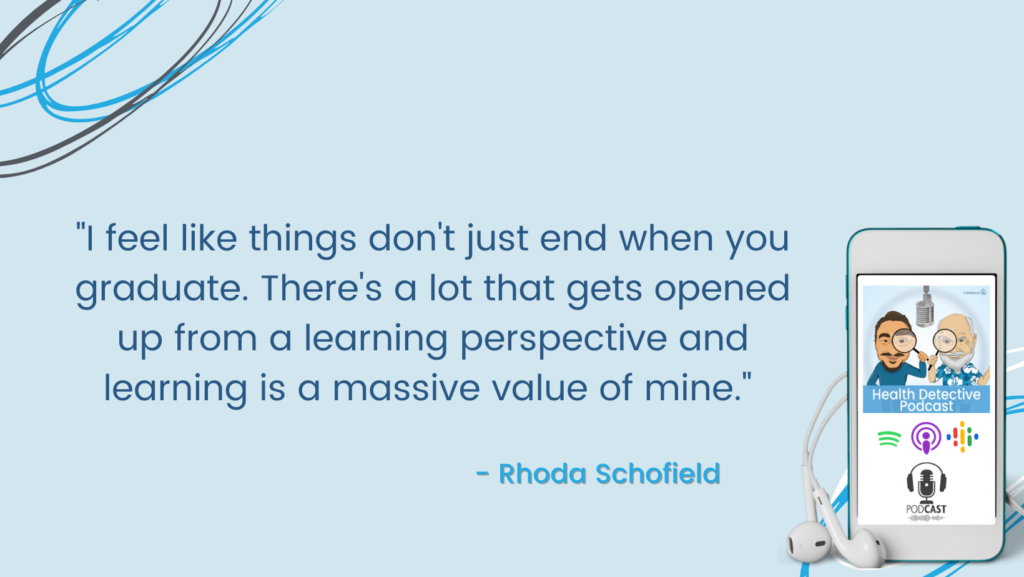
So, I feel like things don’t just end when you graduate. There’s a lot that gets opened up from a learning perspective and learning is a massive value of mine. So that really appeals. That’s another thing that I opened my eyes to.
Structure, Formula, Support, and Extra Support
The other thing was that there’s a real clear structure and formula with FDN that I like. With my mentor, he taught me so much. But then I had a lot of knowledge but didn’t necessarily know how to put it all together for my clients. Having that structure really helps my confidence with knowing exactly how to help people.
Everyone’s different and everyone’s labs come back different, and my protocols will be different 100% of the time for people. But the formula and the template that I use is the same. That to me as a coach is really quite comforting. It really helps me be confident to know that I can actually help everyone using that formula.

The last thing is the support. There is so much support, almost too much. I almost have so much to watch, look at, and read every single day that I’m like, oh, I’m going to miss something really important. You know, like there’s just so much support.
I’m also a member of the FDNthrive, which is a fairly new thing. Once you graduate it’s like a steppingstone and it’s just this extra support that you get. You can actually potentially have access to real clients as well through them. It’s just I really feel like if I have a question, I can definitely get it answered and definitely have that support for myself. It also helps me help my clients better.
FDN’s Community is Hard to Replicate Elsewhere
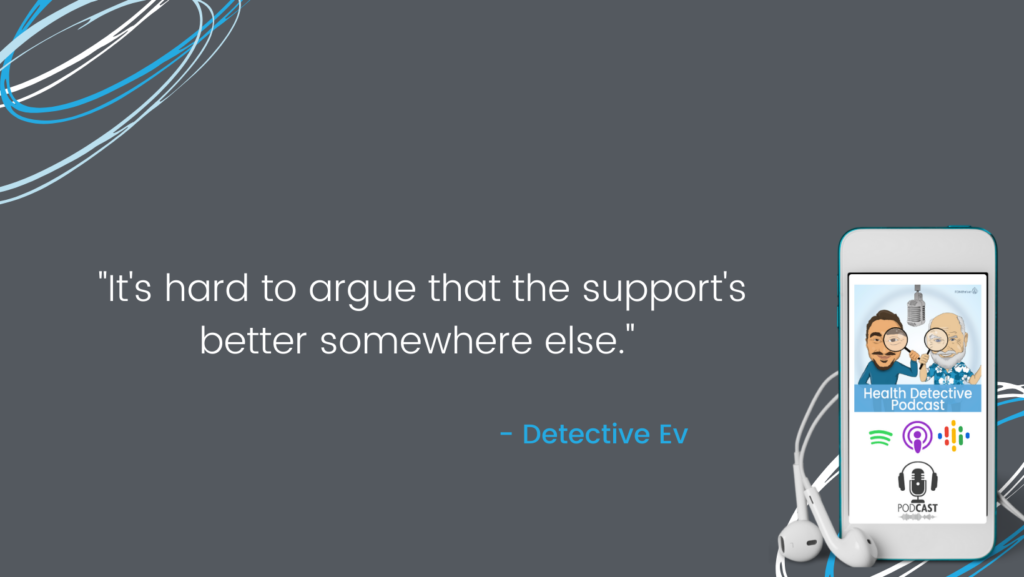
[00:23:26] Detective Ev: So many cool things. It’s the toughest thing and I like emphasizing it a lot, the community/support. We’ll kind of group those in the same thing for today’s sake. What business isn’t going to say nowadays that they have the best community or best support or whatever? But man, I mean, we’re not perfect at everything. I know that. It’s hard to argue that the support’s better somewhere else.
I think it’s because everyone comes into this for the right reason. Maybe even if you’re trying to get insurance, but you still had the issues. You still came in here with the right heart for this type of work.
I think it just makes a place where it’s kind of hilarious. We have the staffed mentors in our professionals’ group, which people can pay to join after graduating. It’s really cheap and they get access there. But let’s be honest. If I ask a question in that group, half the time, it’s not even the paid mentors that are answering, even though they do answer quick. It’s normally someone from the community helping out and just wanting to give a hand. I think that’s amazing. That’s hard to replicate anywhere else.
I’ve talked to Reed before and he’s like, you know what? I didn’t even know that that was necessarily going to happen when I first started all of this. But here we are all these years later and that’s how it worked out. So, it’s kind of cool.
I’m curious, because again, it’s a newer thing for you, but certainly working with people is not newer. What niche are you trying to serve? Have you even thought about the niche thing yet? I feel like you’re someone who might’ve already thought about that.
Helping Those Like I Was

[00:24:40] Rhoda Schofield: I feel like when you’re thinking about your niche, well for me anyway, it’s got to relate to my own personal story. Cause I feel like I can relate more to people when I’ve been through something similar. So, my niche is pretty much who I was when I first started my health journey. The way I kind of explain it is that I help business owners, entrepreneurial types fix their spiraling health issues so that they can best show up in work and life again.
Yeah, so that’s kind of my line that I use. The biggest things that people generally have that I see are things like fatigue, digestive issues around bloating, and neurological issues like anxiety, that sort of thing. So that’s kind of my niche.
[00:25:20] Detective Ev: It’s a common one because I think us Type A or high-performance type of people, we’re pretty much (it’s not that anyone can’t get sick, but like my goodness), we are obviously the first ones to do this cause we are adding unnecessary stress to our lives. When we have the issues with the modern world and how it is, and then we add on a certain type of personality, that is going to be more prone to getting sick.
So, what are your goals now? Is this going to be a full-time thing for you ideally? That you’re just going to be able to do FDN? Or what will your life ideally look like in a few years?
Optimizing Health, Optimizes Life and Work
[00:25:48] Rhoda Schofield: Yeah. So, health coaching is my focus. Also, my husband and I have a scaffolding business here in Australia. I’m kind of a joint director of that. I do work on that at the same time. Yeah, I kind of juggle. When you’re an entrepreneur and you have your own business and you just want to be the best at everything, you know? You just want to really live life, especially now that I’ve got my health in order, and I’m just so much more clear minded.
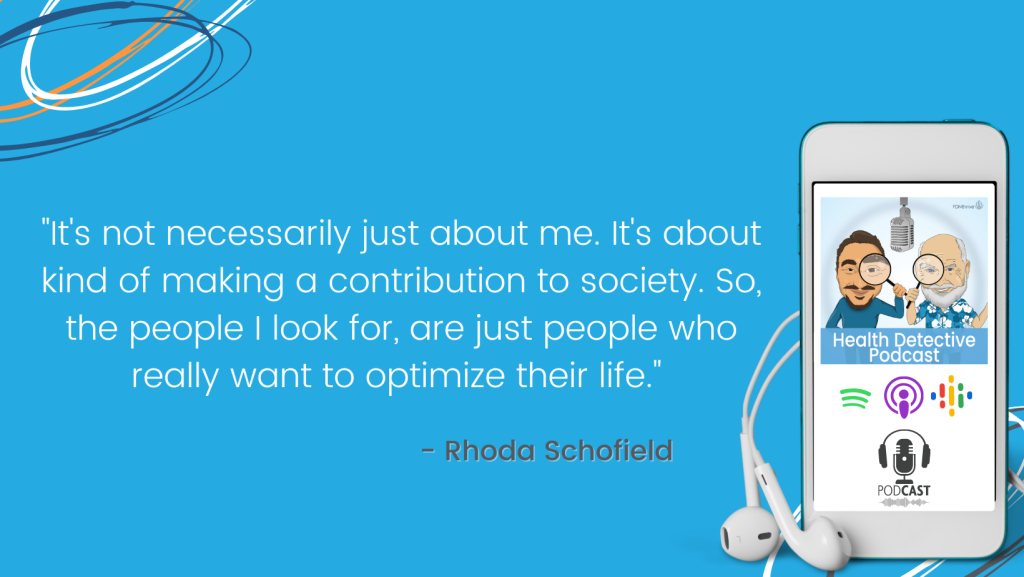
It’s not necessarily just about me. It’s about kind of making a contribution to society. So, the people I look for, are just people who really want to optimize their life. Cause if you optimize your health, then everything else opens up. The people I help are just those people who want that leading edge in life and that extra benefit. It’s only when you start the journey, that you realize just how powerful getting on top of your health is.
[00:26:36] Detective Ev: There’s really nothing like it. As someone who really relates to having a more entrepreneurial spirit, I was in a weird position because I was, like you, sick from a young age. And at 18, I kept thinking, I guess I had time for this. Like in the back of my head, okay, cool. I’ll just get healthy one day. I’ll get healthy one day. Then, I’ll just focus on the work now. But the truth is my work became 10 times more efficient when I finally took that responsibility and got my health under control.
Can’t Enjoy Money or the Things Money Buys When Sick as a Dog
Now everything works better. I’m healthier. I feel better. I’m able to work more and do more consistently because I’m not dealing with extreme fatigue or depression all the time. That’s not really a life for people to be able to work like that. It’s kinda good to get this stuff on the top of our priority list, I should say.

I would hope that even as someone, again, who is highly goal-oriented and very entrepreneurial, guys, please, you know there’s more to life than that. I’m not saying it’s not a worthy pursuit. I love it too. Obviously, Rhoda loves it. But it means nothing if you’re sick. It’s so crazy the people that come to us and I mean, they might have $5 million in the bank, but they’re sick as dogs.
It’s kind of hard to enjoy that money when you’re doing that. The only thing you’re going to be spending that money on is bills from cool toys that you have that you can’t use right now, because you’re too sick and very expensive doctors before you find the FDN philosophy. You know what I mean? So, you’re gonna just waste a bunch of money doing that.
I’m curious. What would you say the number one thing that you learned about for your own health is within the FDN program? I know there’s so much. But I feel like you’re like me where our paradigm’s just constantly getting shifted the more that we did FDN. Was there anything that just like totally shocked you, you never even thought about this as an aspect of health?
Learning Everything is Connected
[00:28:13] Rhoda Schofield: I think for me, when I first started FDN, I was very focused on gut health. What I realized through FDN was that obviously gut health is so important – massive cog in the wheel. But I’ve kind of seen the body as a whole, rather than just the gut. That was the biggest learning I’ve heard.
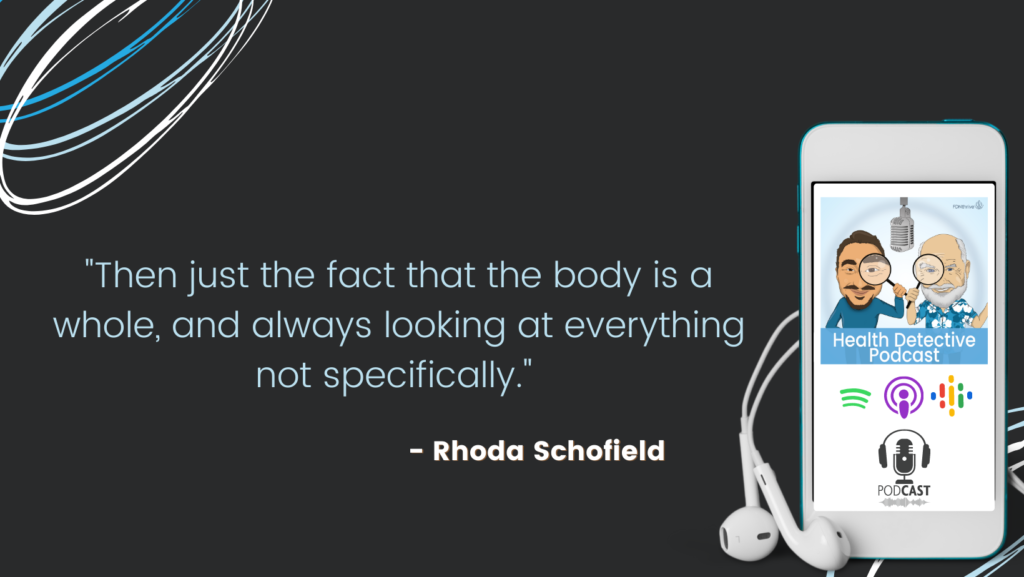
I learned a lot about hormones and a lot about detoxification. Then just the fact that the body is a whole, and always looking at everything not specifically. But just kind of not pulling out a part of the body and saying, that’s what I focus on. You know, just realizing it’s just that one whole thing. Being able to kind of look at it like that has been my biggest learning in FDN.
[00:28:53] Detective Ev: I would say that’s a pretty important one too. It’d be amazing if the entire medical system, both functional, Western, whatever, natural, everything under the sun. It’d be amazing if we all just agreed on that.
It’s so unfortunate in a sense, looking back and seeing that I went to the dermatologist, and they saw my cystic acne. I never even was recommended a psychiatrist or a psychologist, but I went to my family practitioner, and they saw the mental health issues or the GERD, and it was all separate stuff.
It was never once connected. It sounds so simple, especially because this is becoming more and more a thing and the internet spreads things very fast, I’m grateful for that. But you can talk to so many people, more people than not, at least in America, and I’m sure it’s the same in Australia where they just don’t even think like that.
Challenging the Norm
These people aren’t stupid, but if you’re not in the medical field, why would you ever challenge it? Why would you think differently than the normal medical field? You just think, okay. Yeah, you have acne, you go to the dermatologist. You have a headache, you go to the, well, maybe not the neurologist right away. But you might end up at the neurologist or something along those lines or the ENT. We need to shift that.
Whenever something is appearing on my skin, or whenever I’m getting a headache or whenever I’m having like a bad day, I need to ask, and I do this automatically now. I think all FDNs do at some point. What is going on? I never am looking at my skin and saying, oh, I must need more cream or something like that.
If something’s going on in my skin, I’m immediately thinking about anything else but my skin, quite frankly. That’s just the paradigm we eventually learn to operate under. It’s one that’s quite effective. I would never want to be dogmatic about something. But if I’m going to force anyone to think one way, it would certainly be thinking that way. I think we’d make a lot of progress with it.

[00:30:29] Rhoda Schofield: It’s very empowering when you’re that in touch with your body. Because a symptom is really just a little clue that your body’s giving you. When you can tap into that, as I said, it’s very empowering.
Test Results Provide a Place of Empowerment
[00:30:41] Detective Ev: I love that you use that word because it’s one that comes up for me a lot on here.
I hope most people never understand this, but I remember an acupuncturist that I have locally. He’s a great guy, but we challenge each other respectfully. He asked me one time with such a genuine curiosity. It wasn’t with malintent. He said, Ev, don’t you think all those lab tests that you guys use, don’t you think it puts something in people’s heads once they see the lab results.
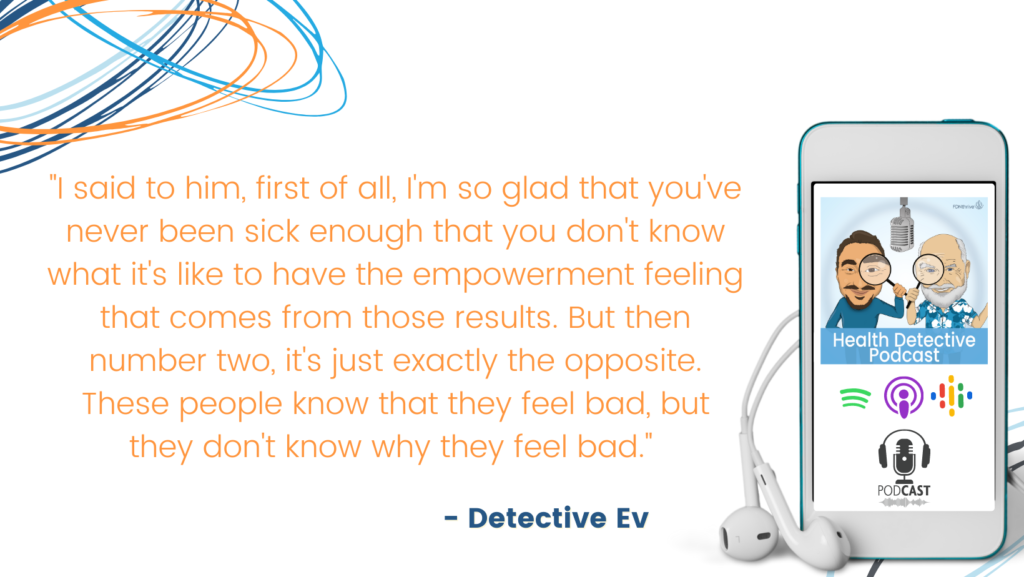
I said to him, first of all, I’m so glad that you’ve never been sick enough that you don’t know what it’s like to have the empowerment feeling that comes from those results. But then number two, it’s just exactly the opposite. These people know that they feel bad, but they don’t know why they feel bad.
So, telling them that the lab tests don’t look great, that’s not something that’s going to cause them bad things. That helps them because now they finally have something to work on. It’s no news to them that they don’t feel good or look good. It’s not actually knowing why. So, it’s a place of empowerment truly.
We take the steps that we can. And sometimes do we have to live a slightly different life than those around us? Yes. But the other side of that is you will eventually most likely surpass the health of most people. You know, even at 42 years old, there’s not many 42-year-olds that aren’t on medication.
Actually, a very true thing in the US, by 60, 65 years old, the average American is on five or six different medications. That’s crazy.
Health is the Foundation for Everything Else
[00:31:55] Rhoda Schofield: The same here in Australia, like those types of stats. I just want to say, like, I don’t know. Have you heard of the Australian cricket, our Shane Warne? Have you heard of him?
Detective Ev: No.
Rhoda Schofield: Yesterday, it was just all over the news here. He’s really famous in Australia and he died at the age of 52. He’s always been like a real character. But he’s never put health first, even when he was playing cricket. And yeah, he died at age 52.
It’s really made me realize just how you can have everything. He’s left something like a $50 million estate behind. He’s got a family, all of that sort of thing. He pretty much has everything. But he just didn’t have his health. It’s just makes me think, like somebody to die so young. It just really kind of shows why we do what we do. Because health is really that foundation.

You can have everything in the world, but if you don’t have your health, you know, something like that could happen. It’s just really tragic, you know?
Life is Short
[00:32:46] Detective Ev: Yeah. I always think about that. I’ve always thought like this, I’m not sure why. It was like a negative thing when I was young, but it turned into a positive. I’ve just always been very aware of how limited our time is here.
I look at my one grandmother right now. She’s 76. She just turned it in January, and I’m 26. Wow. I mean, you know, she’s in great shape right now, and I hope that she lives a lot longer. But let’s be honest. What is she going to live to, a hundred? Probably not. And let’s say she does. Well, that means I only get three more of what I’ve already had and what I’ve already had has gone by in the blink of an eye.
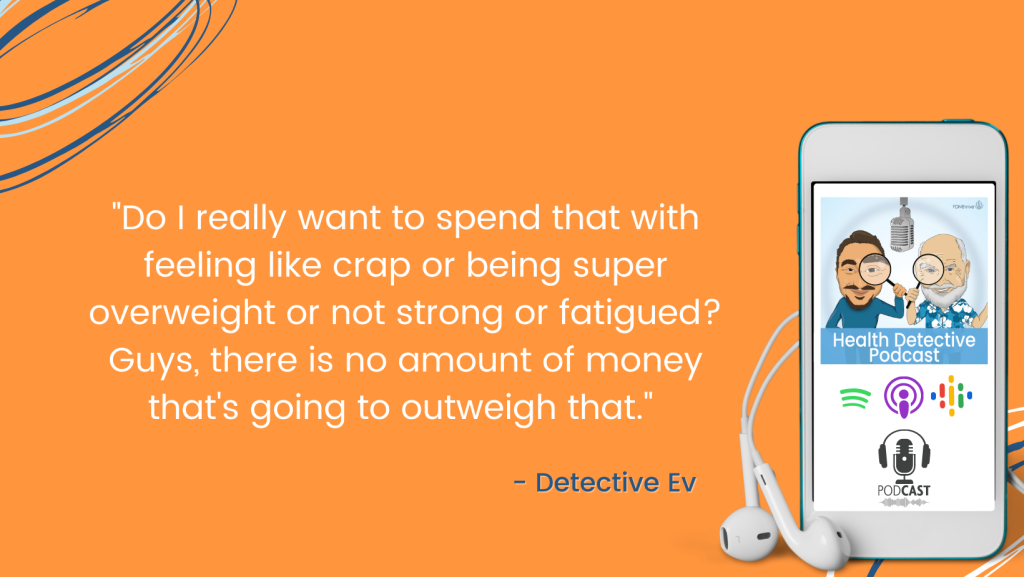
Do I really want to spend that with feeling like crap or being super overweight or not strong or fatigued? Guys, there is no amount of money that’s going to outweigh that. And guess what? Once you get healthy again, you can go pursue the money. Go help other people or make it. No one’s saying don’t do that.
I don’t know who says the quote. It might be the Dalai Lama actually. But it said like, man sacrifices their health to make the money. And then they have to spend all their money to get back their health. It’s just a very, very silly thing. Learn the balance. Learn what you can and can’t do.
Focus on Health
Are some people going to be able to work more hours than you? Probably. And that’s fine. Then you learn to work efficiently.
I love the one woman from FDN, Jenn Malecha. She has a rule where she will do her best to not work over 40 hours a week. And Jenn Malecha does quite well for herself in those 40 hours per week. You know, she does exceptionally well.
The reason she does that is because she realized, you know, when I pushed too hard before that’s when I got this autoimmune disease, that’s when I got the skin cancer diagnosis. So, I’m not going back there. She figured out her health and yeah, she’s doing fantastic. Helping so many people and getting paid fairly to do it.

So, it can be both. Right. But we got to prioritize the intelligent one first. Money can be taken tomorrow. Inflation’s through the roof. You have your health, and you know what to do with it, that’s pretty hard to take away from someone. So we’ve got like a little motivational talk going on almost here at the end.
All right. So, with that all said, we’ll wrap it up here a little bit. I have two more quick things for you. Number one is even though that you’re just starting out, I know that our audience always resonates with each individual who comes on. There might’ve been someone that’s listening for the last 50 episodes, and for whatever reason, Rhoda is the person that they really like. They might be listening from Australia and they’re like, wait, that’s an Australian. I want to go work with her just for that reason, you know? That could totally be the case.
Where to Find Rhoda
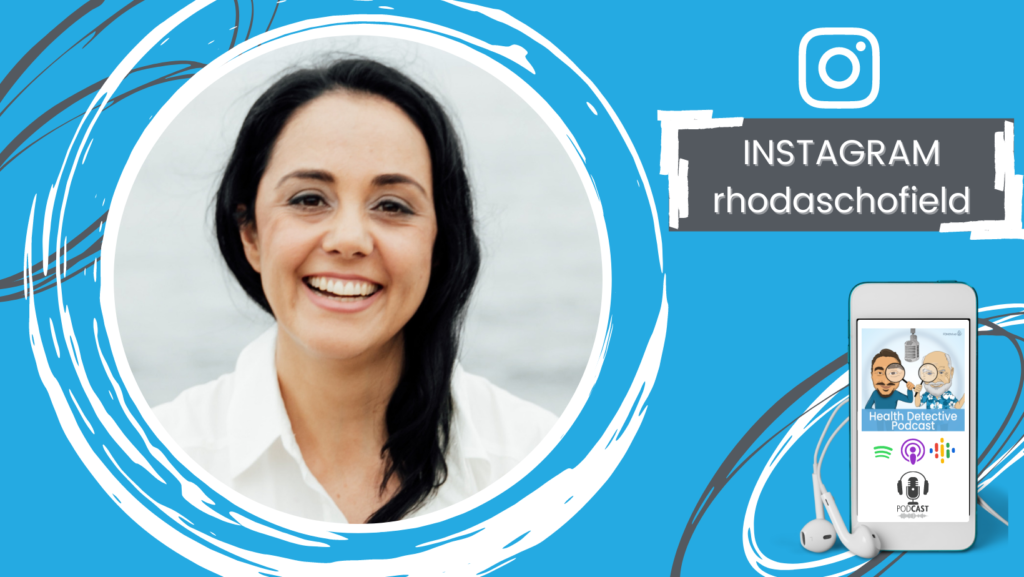
So where is the best place that people can find you if they’d like to get in contact with you?
[00:35:07] Rhoda Schofield: The best place people could find me would be on Instagram. My handle is RhodaSchofield. It’ll be on the show notes, I’m sure. Yeah, that’s the best place. I’m on there a lot and feel free to DM me or comment on anything. I’m always available to be there for you.
[00:35:24] Detective Ev: Excellent. Okay. And yes, we will have that in the show notes, for sure. Then our signature question that we always finish up with on the Health Detective Podcast. And this isn’t a trick. I know that we know of bio-individuality and everyone’s unique, but it’s just a fun question to answer to the best of your ability.
Signature Question – Magic Wand
So, in this case, the question is if I were to give Rhoda a magic wand and you could get every single person in this world to do one thing for their health whether that’s literally do one thing or stop doing one thing. What is the one thing you’d get them to do?
[00:35:57] Rhoda Schofield: Wow, good question.
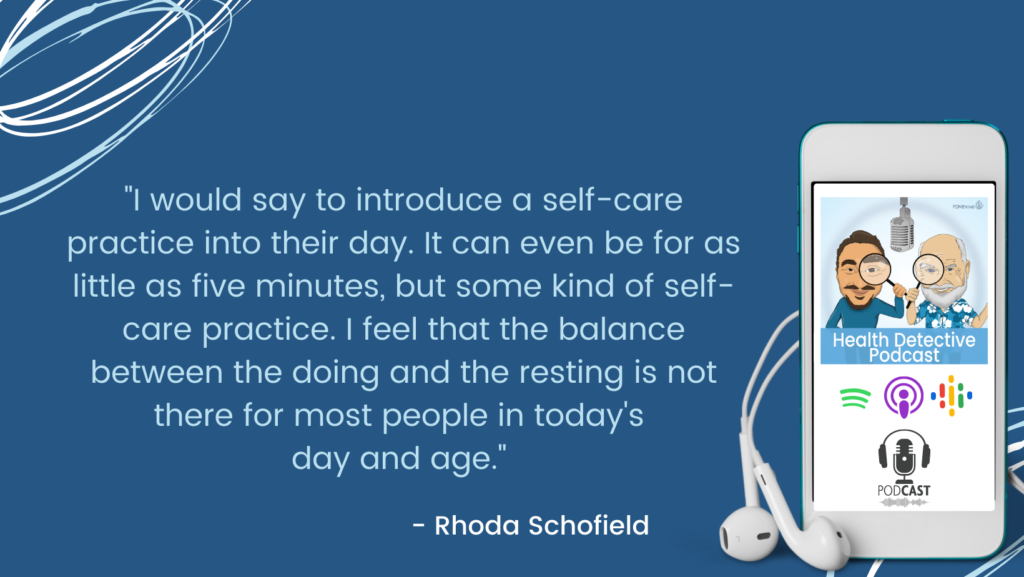
I would say to introduce a self-care practice into their day. It can even be for as little as five minutes, but some kind of self-care practice. I feel that the balance between the doing and the resting is not there for most people in today’s day and age. Just trying to kind of create that sort of parasympathetic rest state.
I need to follow my own advice there as well. So, that could be a five-minute meditation, which is really easy to find online. It could be breathing, like just a 10-minute breath work. Again, something you could find online. It could be just going out and taking a dog for a walk.
Anything that kind of just stops you from the doing, on a daily basis. I just think that that would just do a world of good for so many people.
Bittersweet
[00:37:03] Detective Ev: All right. My friends. Well, I hope you enjoyed our first conversation with someone who was live in Australia at the time of recording. I think it’s kind of bittersweet. The bitter part is that it shows that there are people all over the world dealing with these things. And that there are quite frankly, injustices going on in the healthcare system around the world.
But the sweet part is that there are people like Rhoda out there around the world, fighting the good fight, sharing truth, doing this work, and really, probably just being a light for people that desperately need it if they’ve been through the ringer with the chronic health stuff. So, Rhoda, I commend you.

I don’t want to sound ignorant, from my understanding it’s pretty rough over there right now. I mean, it’s pretty rough in the United States right now. But Australia I’ve heard has been a little tougher with the functional side of things in the natural side. And it takes someone who’s pretty brave and has some guts to go up against that and say, hey, no, this worked for me.
I’m not going against you, but I’m saying that you need to hear me too in the same way that I’m hearing you as well. I commend you for that and please keep doing what you’re doing. There are hundreds, if I’m not mistaken, of FDNs out there in Australia. We have a whole mentorship team just for them right now.
Conclusion
So, if you happen to be an Australian listener and you’re looking into different functional health courses and you want to know, well, can they get me access to the labs? Can they train me with the proper numbers and metrics that would be needed in Australia? The answer to all of those things is absolutely 100% yes. That is what the FDN course is designed to do.
We do have customized things for people in certain parts of the world. It’s not that we have it customized for every single country yet. Yes, Australia is one of those countries that we can accommodate for. So, if you’re interested in learning more about that, you want to pursue this as your work, or just learn more about your own health and dive deep, then go to www.fdntraining.com.
You can also go to functionaldiagnosticnutrition.com. They will both take you to the same place. And then you can click “book a call“. Of course, you can find out more information as well.
But I would book the call because we have a team of course enrollment advisors that are not salesy. They are very conversational. You can literally call almost any time of the day from like 9:00 AM EST to 9:00 PM EST. And if that does not work, of course, you can just schedule one and get it arranged ahead of time. So, listen, we’re looking forward to talking to you guys again soon.

